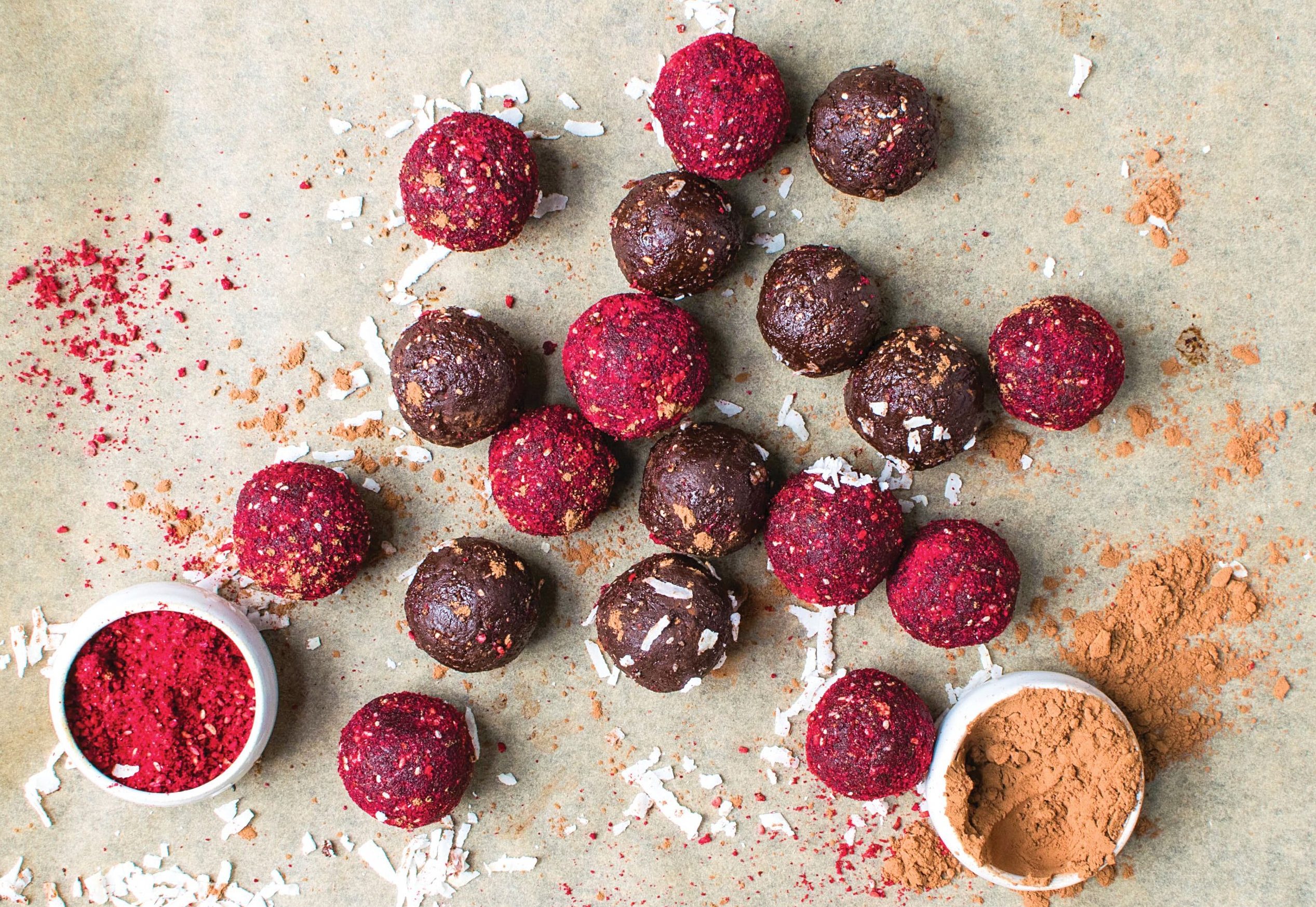In and Out of the Box
Posted on July 7, 2017
Cocoa-Coconut Raspberry Bites (Photo courtesy of Kori Crosson)
Vegan DIY snack service invites families to #rollwithus
Kori Crosson ’09 recalls the childhood “Lobster Incident,” as it became known in her family, that crystallized her thoughts on eating animals.
“At dinner, I was always asking my parents, ‘Why are we eating this? We have a dog as a pet, but we’re eating this animal. Isn’t that odd? Don’t you think this is weird?’ ” says Crosson, who took her final stand on the matter when she was 9. “And then there was the Fourth of July picnic — everyone in my family remembers it. My mom was boiling lobsters, and I decided: I’m not eating meat, and I haven’t eaten meat since that moment.”
At Carolina, Crosson began to think through animal production chains’ bigger environmental impact. She convinced a Carolina Dining Services staff member to tour a caged-hen farm, which led to the dining service offering a cage-free egg alternative.

Kori Crosson ’09
“I’ve always believed that once people are exposed to the realities of industrial animal production that they will honestly admit that they don’t agree with the way things are being done,” Crosson says. A decade later, the campus dining service still offers such choices as cage-free eggs and “Meatless Monday” meals.
After college, Crosson hoped to secure a job with a vegan food company. With the Great Recession squeezing the job market, she adapted skills learned in the School of Media and Journalism to land jobs in marketing at Stanley Black & Decker and in public relations at Hanesbrands.
Then she ventured into the startup world, including with The Purple Carrot, a plant-based meals-in-a-box subscription service, delivering ingredients and recipes to home cooks.
In 2016, Crosson drew on that experience and her ongoing interest in a vegan diet to launch Figberry, a subscription service for do-it-yourself vegan “snack bite” kits aimed at kids and their families. The white box with the pink Figberry logo arrives at customers’ mailboxes with plant-based ingredients, such as dates and other dried fruits, nut butters and spices; a recipe explaining how to combine and roll them up (company hashtag: #rollwithus) into snack balls; and nutrition cards explaining the benefits of the ingredients. Each month brings a different flavor, such as maple-gingerbread or cocoa-coconut-raspberry (the most popular so far).
Crosson and Figberry co-founder Nisha Vora aim to use the fun of families making the treats with kid-friendly techniques — no measuring, no cutting, no hot ovens — to encourage a younger generation to make healthy, and hopefully vegan, choices.
“People are sending us photographs of themselves making our recipes with their kids,” Crosson says about the feedback Figberry has been getting. “To create something that people want and to see those people continuing to share their excitement is incredibly gratifying.”
Getting all that fun and flavor into a box about the size of a best-selling novel has been its own adventure.
Crosson adapted her interests in food and marketing savvy into a pitch for Transcendent Endeavors’ Meaningful Conversations Challenge in 2015, a contest that awarded $100,000 to a for-profit business addressing a social problem related to family communication and early childhood health. Crosson won, connecting her concerns about childhood obesity and animal welfare, and the concept evolved into Figberry.
Surveying families in the New York, New Jersey and Connecticut region, the Figberry duo found busy parents looking for a fun, quick way to pair nutrition education with a lack of mess. The kits usually require only pouring the ingredients into a blender or food processor and then rolling the mixture into golf-ball-sized balls.
Balancing full-time jobs, Crosson and Vora rent out restaurant kitchens in Manhattan to develop their recipes and — often late at night — measure out ingredients, box up orders, “put all the boxes in giant backpacks, and we walk like mules to the post office,” as Crosson puts it.
As Figberry grows, the co-founders plan to outsource production to concentrate on marketing, build the company’s presence in social and other media, and collaborate with nutritionists, food bloggers and celebrity chefs to develop new recipes. A curry-flavored snack bite is on the way, as is an annual kids’ subscription, which will attempt to solve less of the “I want a snack” need and instead help parents hoping to educate their kids about healthy eating in general.
“At UNC,” Crosson says, “I learned to think about ways, interventions, that can break cycles in a person’s education for the good, for the future.”
— Matthew Karkutt ’11
Cocoa-Coconut Raspberry Bites
Kori Crosson ’09 says this has been Figberry’s top-selling recipe.
1 ⁄ 3 cup almond flour
1 cup Medjool dates
1½ tablespoons shredded unsweetened coconut
1 teaspoon chia seeds
1¾ tablespoons unsweetened cocoa powder
1 tablespoon almond butter
A generous dash of sea salt
1 extra tablespoon unsweetened cocoa powder
1 tablespoon freeze-dried raspberry powder for rolling balls
• Remove pits and soak the dates for 10 minutes in warm water. Drain the dates well.
• Combine the dates and almond flour in a food processor. Add the coconut, chia seeds, 1¾ tablespoons cocoa powder, almond butter and sea salt. Combine until a sticky dough forms.
• Roll in cocoa powder and freeze-dried raspberry powder.
• Refrigerate until ready to serve.
Thanks for reading the Carolina Alumni Review
Carolina Alumni members, sign in to continue reading.
Not yet a member? Become one today.
